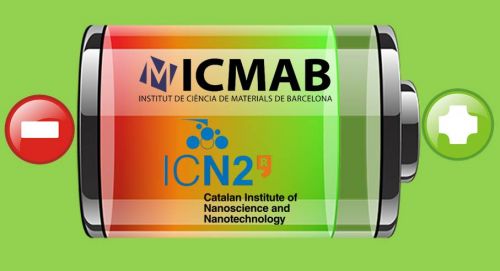
27/07/2018
ICMAB and ICN2 work on the batteries of the future
ICMAB and ICN2 work on the batteries of the future
The challenge to increase the share of green electricity in the energy mix depends on materials science: more efficient photovoltaic cells and more powerful wind turbines to produce more or higher density batteries to store better are some of the challenges that need physics and chemistry to invent and develop the required materials.
In that way, two prospective and promising research results in the field of batteries have been recently published by two top level materials science labs both located in the Universitat Autònoma de Barcelona (UAB) campus, our neighbor and partner: the Institute of Materials Science of Barcelona (ICMAB) and the Catalan Institute of Nanoscience and Nanotechnology (ICN2).
In ICMAB, for the first time, calcium has been electrochemically extracted from a metal oxide in a partially reversible way. According to the researchers, this is a huge step towards the development of rechargeable calcium batteries, a more economical (and with more energy density) alternative than the current most common Li-ion batteries. The study, published in Dalton Transactions, was carried out in collaboration with Toyota Motor Europe, which shares the patent.
In ICN2, researchers that explore conceptual frontiers in the field of electricity storage have developed what they consider a first step and proof of concept of the possible application of electroactive nanofluid electrodes in alternative flow batteries. This work will be released in Electrochimica Acta next August.
ICMAB: http://icmab.es/new-boost-to-future-calcium-batteries
ICN2: https://icn2.cat/en/novel-energy-oriented-materials-group?publications
In that way, two prospective and promising research results in the field of batteries have been recently published by two top level materials science labs both located in the Universitat Autònoma de Barcelona (UAB) campus, our neighbor and partner: the Institute of Materials Science of Barcelona (ICMAB) and the Catalan Institute of Nanoscience and Nanotechnology (ICN2).
In ICMAB, for the first time, calcium has been electrochemically extracted from a metal oxide in a partially reversible way. According to the researchers, this is a huge step towards the development of rechargeable calcium batteries, a more economical (and with more energy density) alternative than the current most common Li-ion batteries. The study, published in Dalton Transactions, was carried out in collaboration with Toyota Motor Europe, which shares the patent.
In ICN2, researchers that explore conceptual frontiers in the field of electricity storage have developed what they consider a first step and proof of concept of the possible application of electroactive nanofluid electrodes in alternative flow batteries. This work will be released in Electrochimica Acta next August.
ICMAB: http://icmab.es/new-boost-to-future-calcium-batteries
ICN2: https://icn2.cat/en/novel-energy-oriented-materials-group?publications
More news
15/10/2020
Parc de l'Alba in a WHO project
02/10/2020
The hydraulic barrier of Can Planas comes into operation
30/09/2020
SENER, the leading urban transport engineering company in Mexico
16/09/2020
Biogas injected into the natural gas grid: works begin!
23/07/2020
Catalan start-ups know how to attract funding
06/07/2020
The Barcelona Synchrotron Park joins the new WEDISTRICT EU program









